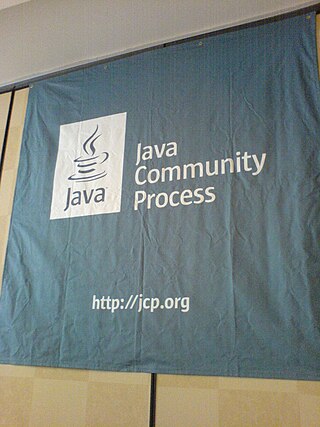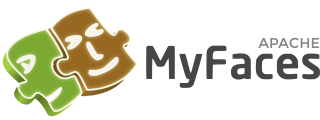
OSGi is an open specification and open source project under the Eclipse Foundation. It is a continuation of the work done by the OSGi Alliance, which was an open standards organization for computer software founded in March 1999. The foundation originally specified and maintained the OSGi standard. The alliance transferred its work to the Eclipse Foundation at the end of 2020. The OSGi specification describes a modular system and a service platform for the Java programming language that implements a complete and dynamic component model, something that does not exist in standalone Java or VM environments. It has a service-oriented architecture based on micro services each implemented as an extended Java class file archive.
Jakarta Enterprise Beans is one of several Java APIs for modular construction of enterprise software. EJB is a server-side software component that encapsulates business logic of an application. An EJB web container provides a runtime environment for web related software components, including computer security, Java servlet lifecycle management, transaction processing, and other web services. The EJB specification is a subset of the Java EE specification.
The Jakarta Messaging API is a Java application programming interface (API) for message-oriented middleware. It provides generic messaging models, able to handle the producer–consumer problem, that can be used to facilitate the sending and receiving of messages between software systems. Jakarta Messaging is a part of Jakarta EE and was originally defined by a specification developed at Sun Microsystems before being guided by the Java Community Process.

Jakarta EE, formerly Java Platform, Enterprise Edition and Java 2 Platform, Enterprise Edition (J2EE), is a set of specifications, extending Java SE with specifications for enterprise features such as distributed computing and web services. Jakarta EE applications are run on reference runtimes, that can be microservices or application servers, which handle transactions, security, scalability, concurrency and management of the components they are deploying.
Java Data Objects (JDO) is a specification of Java object persistence. One of its features is a transparency of the persistence services to the domain model. JDO persistent objects are ordinary Java programming language classes (POJOs); there is no requirement for them to implement certain interfaces or extend from special classes. JDO 1.0 was developed under the Java Community Process as JSR 12. JDO 2.0 was developed under JSR 243 and was released on May 10, 2006. JDO 2.1 was completed in Feb 2008, developed by the Apache JDO project. JDO 2.2 was released in October 2008. JDO 3.0 was released in April 2010.

The Java Community Process (JCP), established in 1998, is a formalized mechanism that allows interested parties to develop standard technical specifications for Java technology. Anyone can become a JCP Member by filling a form available at the JCP website. JCP membership for organizations and commercial entities requires annual fees – but is free for individuals.
Java Management Extensions (JMX) is a Java technology that supplies tools for managing and monitoring applications, system objects, devices and service-oriented networks. Those resources are represented by objects called MBeans. In the API, classes can be dynamically loaded and instantiated. Managing and monitoring applications can be designed and developed using the Java Dynamic Management Kit.
In software, a data access object (DAO) is a pattern that provides an abstract interface to some type of database or other persistence mechanism. By mapping application calls to the persistence layer, the DAO provides data operations without exposing database details. This isolation supports the single responsibility principle. It separates the data access the application needs, in terms of domain-specific objects and data types, from how these needs can be satisfied with a specific DBMS.
Hibernate ORM is an object–relational mapping tool for the Java programming language. It provides a framework for mapping an object-oriented domain model to a relational database. Hibernate handles object–relational impedance mismatch problems by replacing direct, persistent database accesses with high-level object handling functions.
BeanShell is a small, free, embeddable Java source interpreter with object scripting language features, written in Java. It runs in the Java Runtime Environment (JRE), dynamically executes standard Java syntax and extends it with common scripting conveniences such as loose types, commands, and method closures, like those in Perl and JavaScript.
Service Data Objects is a technology that allows heterogeneous data to be accessed in a uniform way. The SDO specification was originally developed in 2004 as a joint collaboration between Oracle (BEA) and IBM and approved by the Java Community Process in JSR 235. Version 2.0 of the specification was introduced in November 2005 as a key part of the Service Component Architecture.

Apache MyFaces is an Apache Software Foundation project that creates and maintains an open-source JavaServer Faces implementation, along with several libraries of JSF components that can be deployed on the core implementation. The project is divided into several sub-projects:
Jakarta PersistenceAPI is a Jakarta EE application programming interface specification that describes the management of relational data in enterprise Java applications.

Craig L. Russell is an American software architect and author. He contributed to the book 97 Things Every Software Architect Should Know.
Jakarta RESTful Web Services, is a Jakarta EE API specification that provides support in creating web services according to the Representational State Transfer (REST) architectural pattern. JAX-RS uses annotations, introduced in Java SE 5, to simplify the development and deployment of web service clients and endpoints.
DataNucleus is an open source project which provides software products around data management in Java. The DataNucleus project started in 2008.
Java Database Connectivity (JDBC) is an application programming interface (API) for the Java programming language, which defines how a client may access a database. It is a Java-based data access technology used for Java database connectivity. It is part of the Java Standard Edition platform, from Oracle Corporation. It provides methods to query and update data in a database, and is oriented toward relational databases. A JDBC-to-ODBC bridge enables connections to any ODBC-accessible data source in the Java virtual machine (JVM) host environment.
ObjectDB is an object database for Java. It can be used in client-server mode and in embedded mode.






